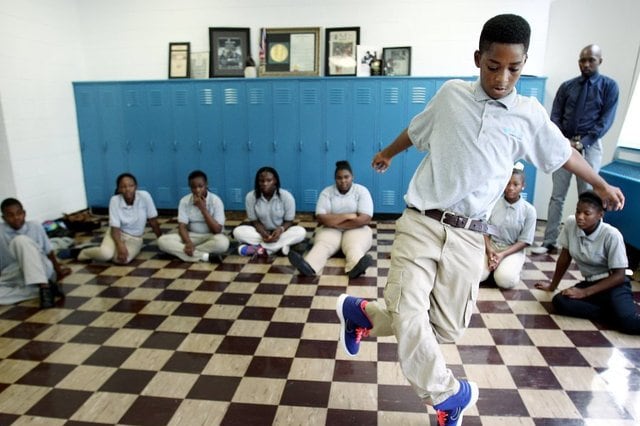Impassioned community members pleaded with the Shelby County school board Tuesday night to keep two KIPP charter schools operating, despite low test scores. The district is considering shuttering them after administrators said the schools failed to meet standards for academic success.
Shelby County Schools administrators have recommended revoking charters of KIPP Memphis Academy Middle School and KIPP Memphis Collegiate Elementary based on low test scores at both schools.
The middle and elementary schools are part of KIPP, a national nonprofit network of public charter schools. Since coming to Memphis nearly two decades ago with the opening of one school, the regional network has grown to five schools — two elementary schools, two middle schools, and one high school — and now serves nearly 1,800 students in and around North Memphis.
Three-year TN Ready test averages from the 2016-17 to 2018-19 school years show only about 6% of KIPP Memphis Academy Middle students reached or approached mastery in math, according to district records. During the same time period, about 10% of students reached or approached mastery in English.
At KIPP Memphis Collegiate Elementary, about 10% of students reached or approached mastery in English and 18% in math, during the same period.
Antonio Burt, CEO of KIPP Memphis Schools, said he’s not satisfied with the two schools’ academic performance, but said many KIPP students come from economically disadvantaged backgrounds and often face greater learning challenges.
At KIPP Memphis Collegiate Elementary and KIPP Memphis Academy Middle, about 86% and 78% of students, respectively, are considered economically disadvantaged.
Burt, who has headed the charter network since November, highlighted its efforts to improve, including boosting literacy, curriculum and instruction, school culture, and the recruitment of high-quality teachers.
Burt pointed out that the district itself found that if the elementary and middle schools were to close, many of their students would be assigned to other district-managed schools with even lower school performance scores.
According to the report, of the middle school’s 227 students, the district estimated about half would transfer to lower-performing schools, including district-managed schools with sagging test scores and Achievement District schools that the state runs due to chronic underperformance.
Of the elementary school’s 324 students, the district predicted at least 59 would transfer to a lower-performing district or state-managed school, the report states.
Board member Stephanie Love agreed with Burt, and suggested the district may want to consider changing the structure of charter agreements and how administrators decide which charter schools should close.
“I don’t see, especially for the middle school, another viable option for students if they were to consider closing this school,” Love said.
Other board members expressed their support for KIPP and their belief that Burt is qualified to lead a turnaround within the charter network. Burt, who most recently served as SCS chief of schools, received national acclaim for his work turning two low-performing Memphis schools into models of student achievement.
“I am here to support KIPP,” board member Althea Greene said. “I would really like to give them an opportunity to prove themselves. No doubt, sitting in front of us is a very capable leader.”
Community members and parents echoed board members’ comments. Dianechia Fields, representing The Memphis Lift, said the parent advocacy organization supports Burt and the KIPP network.
“Looking at the data, yes it’s disappointing, but leadership matters and the leadership that’s in place today and his team — we have faith that they can turn those numbers around,” she said.
Although Temicka Oliver’s daughter, an eighth-grader at KIPP Memphis Academy Middle, wouldn’t be affected if the school were to close after this school year, she fears that other students would miss out on the positive impact the school had on her daughter.
Oliver’s daughter has attended the middle school since fifth grade and previously attended the KIPP elementary school with most of the same classmates. The atmosphere is tight knit — like a loving family, Oliver said.
“We want all those kids to have the same opportunities as she had,” Oliver said.
Tuesday’s charter grievance hearing came almost a week after the school board decided to close a non-KIPP charter school, the Memphis Academy of Health Sciences, for non-academic reasons at the end of the school year. Memphis Academy of Health Sciences can appeal the decision to the newly formed Tennessee Public Charter School Commission. Also last week, the board spared Memphis STEM Academy after hours of debate over exceeding its enrollment.
The board is scheduled to vote on closing KIPP Memphis Academy Middle and KIPP Memphis Collegiate Elementary at its Jan. 25 meeting at 5:30 p.m. at the Board of Education.






